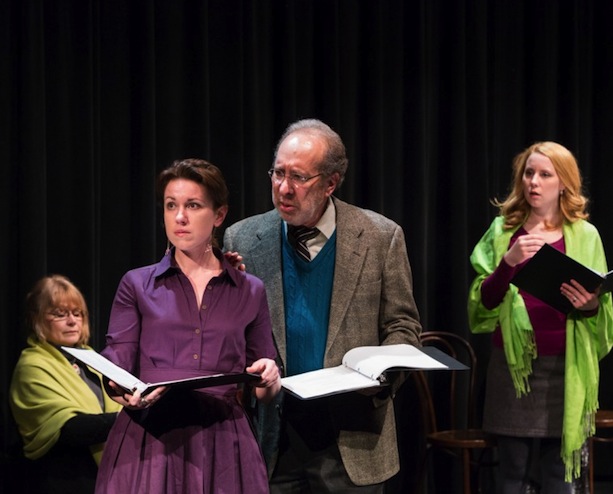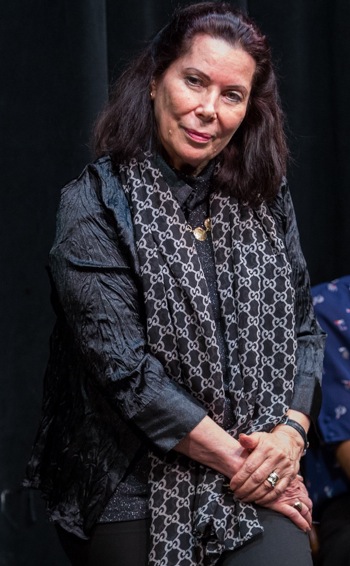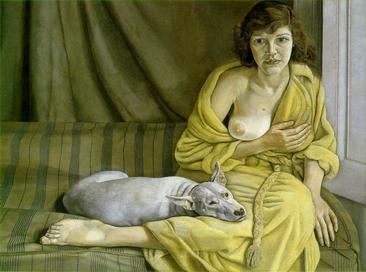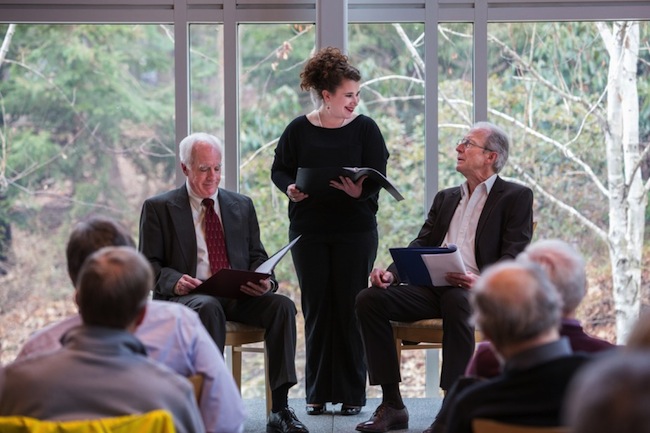Theater Feature: Savyon Liebrecht — In Residence at Israeli Stage With Two Plays About Freud and his Family
Dramatist Savyon Liebrecht was recently in the Boston area for a residency with Israeli Stage — two of her scripts, both dealing with Freud and his legacy, received their world premieres here as workshop productions.
Dear Sigmund and Carl by Savyon Liebrecht. Staged reading directed by Guy Ben-Aharon. Presented by Israeli Stage. At Springold Theatre at Brandeis University, Waltham, MA, March 27 and Babson College, Wellesley, MA, March 29 and 31.
Freud’s Women by Savyon Liebrecht. Staged reading directed by Melia Bensussen. Presented by Israeli Stage. At Boston Playwrights’ Theatre at Boston University. March 30.
By Ian Thal
Dramatist Savyon Liebrecht was recently in the Boston area for a residency with Israeli Stage, Guy Ben-Aharon’s company devoted to presenting Israeli theater to American audiences, for two weeks in March and early April. The residency, which was sponsored by CJP and StandWithUs and area universities including Boston University, Brandeis University, Babson College, and Emerson College, included public lectures as well as staged readings of two new plays about Sigmund Freud and his family.
The two plays were created through the encouragement of Yevgeny Aryeh, the Russian-born Israeli artistic director of the Gesher Theater in Tel Aviv, after he had seen the a production of Liebrecht’s The Banality of Love, a play about the affair between German philosopher Martin Heidegger and his student, the political theorist Hannah Arendt. (The script will again receive a staged reading via Israeli Stage on April 28th at Boston University.) Liebrecht wrote three plays, one of which is currently being workshopped in Israel. On the other hand, Dear Sigmund and Carl and Freud’s Women received their world premieres here as workshop productions. Originally written in Hebrew, the English translations were done by Liebrecht with tweaks by Ben-Aharon.
Given the nature of workshop setting, it must be understood that my observations are based on seeing works in progress. Fully staged productions in either Hebrew or translation may be considerably different. Thus some of my comments are to suggest possibilities that the playwright might consider as the plays are further developed.
Dear Sigmund and Carl, which was presented at Brandeis and later at Babson, focuses on the 1970 meeting between the ailing Ernst Freud (Will Lyman), the fourth child of Sigmund and Martha Freud, and Franz Jung (Richard Snee), the son of Carl Jung, at the Freud house in London. The occasion was for the pair to discuss the final arrangements for the publication of the correspondence between their fathers. No record of the meeting exists beyond the fact that both came to an agreement and that the brief personal correspondence between them (Ernst would die later that year) was friendly.
A cordial meeting does not lend itself to compelling drama, no matter who is in attendance, but Liebrecht fairly skillfully uses the historical record to generate some sparks. One of her key innovations is to introduce the fictitious character of Susan (Rebecca Schneebaum), an attorney for the Freud family. She is a rare instance of a fictitious character inserted into a drama about historical figures who manages to matter. In the opening scene, she briefs Ernst and the audience on the stakes. As those with only modest familiarity with the history of psychoanalysis know, Carl Gustav Jung was considered to be one of Freud’s most promising acolytes, at one point seen as his heir apparent in cultivating the new science. When they split, it was not only over theoretical matters, but on personal and political grounds. Freud’s model of the unconscious was rooted in the biological functions of the human animal; Jung delved into various systems of mysticism and pseudosciences such as alchemy. His interests included tarot, astrology, and a Christianized conception of Kabbalah as well.
While Freud and his immediate family were driven out of Vienna after the Nazi Anschluss of Austria in 1938 and the rest were later killed in the Holocaust, Jung stayed put in neutral Switzerland. While psychoanalysis was being dismissed in Germany as a “Jewish science,” Jung’s interests in occultism and European folklore were attractive to the Nazi intelligentsia, to the point that he was forced to sharply distinguish his work from Nazi philosophy throughout the ’30s and ’40s. Relations between the two thinkers’ followers remained generally hostile long after their deaths.
Susan suggests that these facts are potential avenues of attack Franz will use on Ernst, or that they will be weapons that Ernst may use on Franz. Susan hangs Girl With a White Dog, a painting by Ernst’s son Lucien, where Franz cannot miss it. Lucien, by 1970, was already considered one of Britain’s great living painters. The painting in question portrays Lucien’s first wife, Kathleen “Kitty” Garman, baring one of her breasts while reclining on a sofa. Susan believes that this realist parody of an odalisque, with its Freudian name-dropping and aggressive nudity, will intimidate Franz.
Franz, too, has been briefed by his own lawyers, and so the sons engage in verbal battle for the honor of their respective fathers. However, they soon realize that they both pursued architecture in order to stay out of their fathers’ intimidating shadows, and eventually the pair decide that they would prefer to honor the time that their fathers had been friends.
The second play, Freud’s Women, which was presented at Boston Playwrights’ Theatre, takes place in 1940, the year after Freud’s death. As London is being pounded by German bombs, Freud’s widow, Martha (Paula Langton), sifts through her husband’s papers with the help of Paula Fichtel (Obehi Janice), a maid who had served the family in Vienna. She has found a receipt from a trip that her husband took with her sister, Minna Bernays (Karen MacDonald,) during which they had shared a hotel room and registered as a married couple. The find arouses old jealousies and Martha’s suspicions that her sister and husband had been lovers (an allegation also made in Dear Sigmund and Carl ). Much of the story is told in flashback, as the two women remember their lives with the Viennese doctor (Ken Baltin): we see that on the first Sabbath of his marriage Freud banned ritual observances, such as candle lighting. He identified ethnically as a Jew, but saw religion as a manifestation of neurosis. Freud’s intellectual interest in Judaism, though, would persist to the end of his career, culminating with the publication of Moses and Monotheism in 1938. Meanwhile, Martha is said to have returned to the lighting of Sabbath candles immediately after his death.
The younger Minna (Erica Spires), whose fiancée had died, came to live with Sigmund and Martha (Liz Hayes) during Martha’s pregnancy with Anna, who would later become a leading psychoanalyst herself. In the process of helping to manage the household, Minna became involved with her brother-in-law’s work in a manner that Martha did not. It was an intellectual fellowship that was lacking in the marriage. In the play, Martha and Minna seem to resolve their long simmering rivalries: Liebrecht is committed to a view of Freud as an intensely ethical man who neatly compartmentalized all his relationships in order to avoid any conflict. But another matter comes to the front: Freud’s psychoanalytic reflections on his daughter Anna. Psychoanalysts are called on to undergo analysis themselves; thus Freud analyzed his daughter, an act that continues to be a source of controversy. (Liebrecht even has Minna describe the act as a figurative form of incest). When Anna (Miranda Craigwell) finally appears on stage, she is outraged to find her mother and aunt peering into her file.
Liebrecht also neatly addresses this controversy. Noting Anna Freud’s friendship and professional partnership with Dorothy Burlingham (their ashes rest side by side at the Colders Green Crematorium along with other members of the Freud family), the playwright builds on speculation that Anna and Burlingham were a committed lesbian couple. Freud’s questionable decision to analyze his own daughter—rather than have it done by a colleague—is rationalized as an attempt to discreetly protect her from the homophobia of the time. Well over a century ago, Freud had publicly advocated that homosexuality not be a barrier to full participation in society.
Freud’s Women‘s large cast, the compressed rehearsal time that goes into a staged reading, and its short run performance schedule make talking about the performers’ interpretations of their roles difficult. However, the constant flashbacks from 1940 to various points in time when Freud was still alive might have been confusing without the deft directorial hand of Melia Bensussen, especially in scenes in which the older and younger Marthas and Minnas share the stage.
In contrast, a three-hander like Dear Sigmund and Carl gave the actors more time to inhabit their roles, whether it was to develop simple gestures, such as Snee’s portrayal of Franz Jung being temporarily mesmerized by the exposed breast in Girl With a White Dog, Schneebaum’s Susan taking evident pleasure at playing the role of snarky but hyper-competent employee, or Lyman’s presentation of Ernst as ambivalently resigned both to death and the responsibilities that come with the name of Freud.
While the two plays clearly reflect upon one another, with such through-lines as Freud’s alleged affair with Minna, the question regarding his psychoanalysis of Anna, the fate of his personal papers, his family’s flight from Vienna to London, and of course, the common setting in the house that now houses the Freud Museum, the question remains of what lives these two plays will lead once Liebrecht has completed her revisions. They are both short one-acts. Will they be performed separately? Back to back on a single night? Which one will follow the other? Might they be combined into a single, longer play, with alternating scenes set in different eras, much as with Tom Stoppard’s Arcadia or India Ink? On their own, the plays feel slight.
In The Banality of Love, Liebrecht successfully outlined some basic elements of Heidegger’s and Arendt’s thinking while fitting in some key biographical details. Ultimately, beyond the pair’s brief love affair, the dramatist had little to say about the reasons behind Arendt’s decision to rehabilitate the post-war reputation of Heidegger, who had embraced the role of a Nazi philosopher. Likewise Dear Sigmund and Carl, stripped of its talk about the clash of psychological ideas, is really only about sons making peace with their fathers and settling family feuds. Meanwhile, the women in Freud’s Women are defined entirely by their relationship with the great man; at least Franz and Ernst had some parts of their lives that they could call their own. Liebrecht seems enamored in her history plays about the loves (both familial and romantic) of the great thinkers.
Perhaps by uniting the two plays, Liebrecht could also explore how the European Jewish intelligentsia was driven off the continent and into the Anglophone world. Perhaps then Liebrecht would be able to dig deeper into what may be a potentially fascinating feminist critique of the psychoanalytic view of gender (something only briefly alluded to by Susan but otherwise not pursued in either play): after all, that first generation of Freudian disciples included Melanie Klein and Karen Horney. Without embracing the occultism of Jung, both of them disputed psychoanalytic dogma (the centrality of penis envy and the Oedipal complex) on the formation of male and female gender identity.
Ian Thal is a performer and theatre educator specializing in mime, commedia dell’arte, and puppetry, and has been known to act on Boston area stages from time to time, sometimes with Teatro delle Maschere, and on occasion served on productions as a puppetry choreographer or dramaturg. He has performed his one-man show, Arlecchino Am Ravenous, in numerous venues in Massachusetts and Rhode Island, and is currently working on his second full length play; his first, though as-of-yet unproduced, was picketed by a Hamas supporter during a staged reading. Formally the community editor at The Jewish Advocate, he blogs irregularly at the unimaginatively entitled From The Journals of Ian Thal, and writes the “Nothing But Trouble” column for The Clyde Fitch Report
Tagged: Dear Sigmund and Carl, Freud's Women, Guy Ben-Aharon, Israeli Stage, Melia Bensussen




